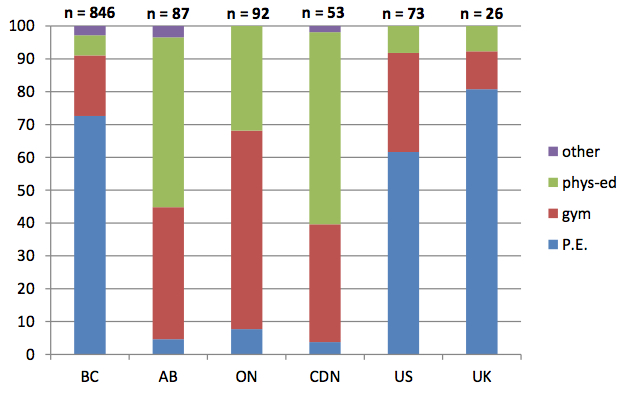DCHP-2
P.E. [pi'i:] PE DCHP-2 (October 2016)
n. abbreviation — British Columbia, Education
physical education: a school subject of active exercise and sports training, typically offered in primary and secondary schools.
Type: 5. Frequency — The term P.E. is one of the items that sets British Columbia apart from the rest of Canada. BC has been identified as a dialect region within Canada based on phonology, while less has been done to study distinctive patterns in lexis (see, e.g. Dollinger & Clarke 2012: Table 1, based on Boberg 2008, 2005). The patterning of P.E. shows that potential lexical markers for BC warrant more study. Gregg (1995), who uses substantial BC data from the late 1970s, had no data to compare BC English with that of the rest of Canada, yet he offers a useful starting point for such a study.
P.E. shows a profoundly BC dimension. As an analysis by Chen (2014), reproduced in Chart 1, shows, more than 70% of British Columbians report P.E. as the name of the school class (n=846), while in Alberta and Ontario, but also overall in the rest of Canada, the percentage is less than 10%. With this term, BC patterns with the US data from the BC Linguistic Survey from 2014 (Dollinger 2015b: 262-4), where more than 60% report the term (n=73 and small) and even more in the UK comparative sample (but n is low; n=26). Outside of BC, the preferred terms are "gym" or "phys-ed", a shortening of "physical education". The quotations demonstrate the near-unique status of P.E. as a linguistic marker of BC English within Canada, as they are exclusively from that province.References:
Images:

Chart 1: Data from the 2014 BC Linguistic Survey (Dollinger 2015b: 262-64), analysis from Chen (2014). Source: Chen (2014: Figure 3)